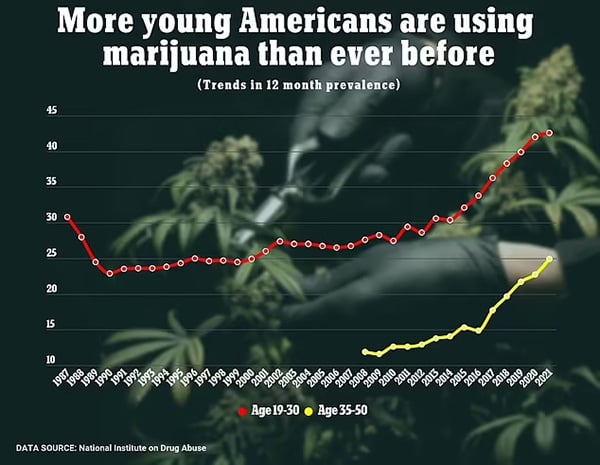Americans favor legal marijuana over legal tobacco

Americans favor legal marijuana over legal tobacco

A new survey suggests that for the first time, more Americans prefer legal marijuana to legal cigarettes.
In an official survey carried out by the Centers for Disease Control and Prevention (CDC), 59% of Americans supported legalizing marijuana for recreational or medical use.
Meanwhile, a recent Pew Research Center poll found that 57 percent of Americans also favor banning tobacco products.
The sea-change of public opinion is the result of decades of anti-smoking campaigns combined with softening attitudes toward marijuana.
The results of two public opinion polls indicate that support for legal marijuana in the United States is now higher than support for cigarettes.
There are signs, however, that marijuana may finally be hitting a wall after voters in Oklahoma overwhelmingly rejected recreational pot yesterday, 62 percent to 38 percent.
Tobacco use has been declining in the US since the 1960s when evidence of a link to cancer first emerged.
At the time, about 20% of Americans smoked, but now that's only around 10%. But over the past decade, the United States has seen a marijuana revolution.
Over the past decade, marijuana use among all age groups has more than doubled to 16 percent. Among those under 30, the proportion soared to a record 45 percent.
In the US, there are 21 states and Washington, DC, that have moved to lift bans on the drug, with Hawaii becoming the latest country to move toward full legalization this week.
In young adults, marijuana can be harmful as it can permanently change the developing brain's structure, impacting IQ. It can also lead to mental health issues in some people predisposed to these risks.
The Centers for Disease Control and Prevention (CDC) asked 6,455 Americans if they would like to see all tobacco products continue to be sold.
Results released last month showed only 42.7 percent in favor, with the rest opposed.
Older age groups were more likely than younger people to support continued sales, but no age group averaged 50 percent or higher.
By comparison, the Pew Research Center, a Washington, D.C.-based pollster, surveyed 5,098 Americans.
It found that 88 percent of respondents supported legalization to some degree. Of those, 59 percent said it should be used for medical and recreational purposes.
Support is highest among younger age groups - up to 72 percent among those under 30 - but drops to less than half among those over 65.
Democratic voters are almost twice as likely as Republicans to support legalizing marijuana for recreational and medical use.
In the latest move against the tobacco industry, California has become the second US state - after Massachusetts - to ban menthol cigarettes.
This type of cigarette is not as harsh on the lungs for the user to smoke; therefore, they can inhale deeper. As a result, they expose the lungs to more nicotine and other chemicals in cigarettes.
It has also been suggested that the pleasurable smell of menthol cigarettes entices people who would not normally smoke to take up the habit.
After Oklahomans flatly rejected a plan to legalize recreational marijuana in the state, anti-marijuana activists celebrated their victory over a better-funded opponent - dubbed "Big Cannabis."
On the other hand, however, restrictions on the sale of cannabis continue to be lifted.
Just this week, Hawaii's Senate passed a bill that would allow residents to smoke marijuana recreationally and carry up to an ounce with them. It still needs to be approved by the governor.
But now there are signs that recreational pot has finally hit a wall.
Yesterday, Oklahoma rejected a bill that would have legalized the drug.
Its anti-marijuana activist and former White House drug czar Kevin Sabate called the victory a victory for "public safety and common sense."
The group's anti-marijuana campaigner and former White House drug czar Kevin Sabet called the victory a victory for "public safety and common sense.
'The industry cannot buy votes and profit off our children,' he said.
"Although [activists] vastly overspent, they worked tirelessly to educate voters about the unintended consequences of legalization, from more incidents of impaired driving and workplace accidents to higher youth usage."
In November, North Dakota, South Dakota, and Arkansas also voted to ban recreational marijuana.
They were three of five states that used the drug for polling at the time, with Maryland and Missouri becoming the latest states to support the measure.
Only Idaho, Kansas, and Nebraska have stood their ground and banned the recreational and medical use of marijuana.
But experts predict that more states will lift their bans in the coming years, and the law at the federal level could be rolled back.
Driven by huge profits in California, New York, and New Jersey, the US marijuana market has reached about $26.1 billion in sales and is on track to reach $44.5 billion by 2027, according to research firm BDSA.





